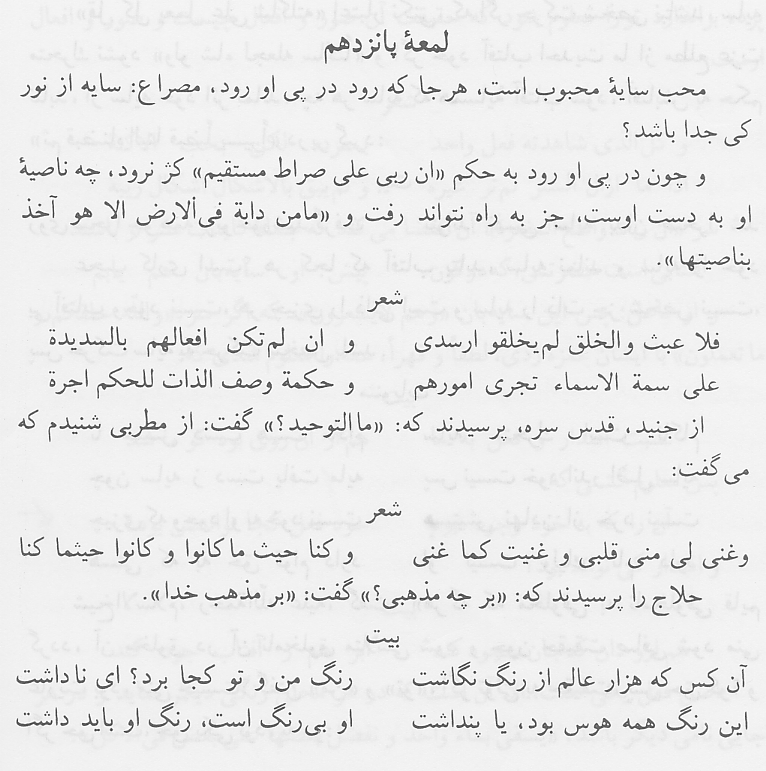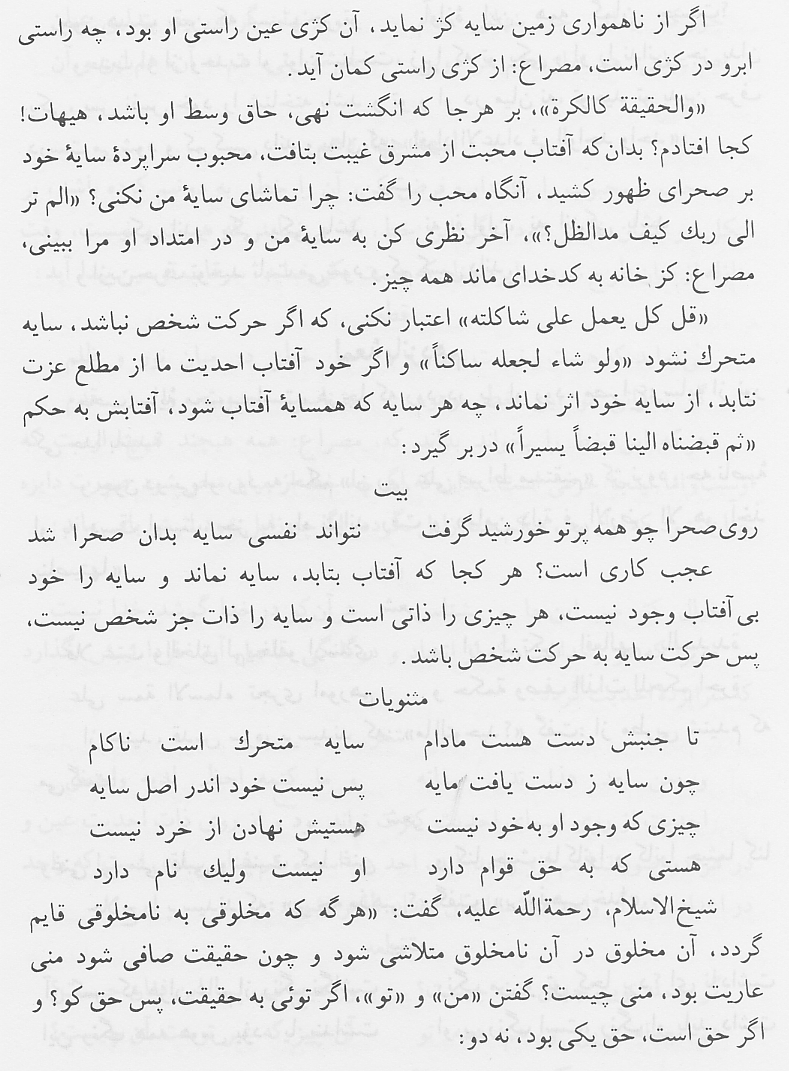
Lesson 15
The lover is the shadow of the
Beloved (The Creator). Every place the Beloved goes the shade (the
lover)
follows: How can shadow be separated from light?
This shadow follows It (The
Creator) according to this rule: “It is my
Lord
that is on a straight path” (Koran[11:56]) and can not go astray since
its
forelock is held by Its hand and other than the set path can not go
anywhere:
“There is not a moving creature, but It has the grasp of its fore-lock”
(Koran[11:56]) :
No frivolity!
And creation was not
produced for neglect
And in case their
actions did not
land on target
Upon the stipulation of
Names flow
all their affairs
Decrees sailing upon the wisdom of
attributes of Essence
Jonaid was asked, “What is
Tawhid
(One-ness)?”. Replied, “ I heard a musician [1] sang
once:
Enrich my heart
for I, freed me
from all want and I sang
And we
are where ‘It’ is not, ‘It’ is not where we are at
Hallaj
was questioned, “What is your Mazhab (sect)?” Responded, “I am on the
Mazhab
(road entered upon) of God”[2]:
The one
who designed a thousand worlds from colors[3]
O! Poor
one, where did it take mine and yours?
These
dyes just whims and lust, all just thoughts
‘It’ is
color-less, best to be colored by Its dyes
If the
earth is uneven then the shadow will be crooked. That
crookedness is the
essence of its correctness, like the function of the eyebrow is through
its
arch:
“From
this crookedness comes the straightforwardness just like from the bent
of the
bow comes the straightforward flight of the arrow.” [4]
“Truth
is spherical”. Placing the finger upon any point, the truth is at the
center!
Far from the mark! [5] Where have I
fallen?
Know that the sun of loving
rises from the east of the absence and
disappearance (of Beloved). Beloved draws the curtains of Its shadow
over the
desert of manifestation and asked the lover: Why don’t you gaze upon my
shadow?
“Have you not turned your vision to your Lord? How He does prolong the
shadow”[6] in other words if you
look at My Shadow along its length (at
the end) you will see Me!
”Say: Everyone acts according
to his own disposition…” (Koran [17:84]) should not be trusted (it is
misunderstood). If the person does not move, his shadow will also not
move: “If
He willed, He could make it stationary!” (Koran [25:45]). If the sun of
One-ness does not rise from the ascension of greatness, then there
shall be no
shadow. Since any shadow that neighbors a sun, that very sun embraces
the
decree: “Then We draw it in towards Ourselves…” (Koran[25:46]):
In a
desert, once the rays of sun engulf the terrain
No one
whatsoever can produce a shadow upon that desert
What an
amazing affair? Wherever there is sun no shade remains, and shadow
cannot exist
without a sun! Anything has within an essence, and for shadow there is
no
essence except the person (standing in front of the light), therefore
the
movements of shadow subject to the movements of the person [7]:
As long
as the hand moves endless
Movements
of shadow follow helpless
Once the
hand gives the shadow its essence
That
essence not from the shade itself
Whatsoever its ‘being’ is not from itself
Placing
the trust upon it not clever
A being
subsisting upon the Haqq [8]
That
being is not ‘It’ but a Name in fact
The old
sage of Islam (?) once said, “If a created being can hide within a
non-created
being, indeed shall shatter within that non-created being. And once
this truth
is made pure and clear, much shame shall come from “My Self”! What
(nonsense)
is this “My Self”? Uttering “I” and “You”, if you are the truth, then
where is
the Haqq? If there is a Haqq, It is only one, not two”:
You and
I made the count for Mankind two
Without
you and I, You are Me and I am You [9]
Language:
‘Name’ is used in the context of all things including sciences,
knowledge(s),
software, data, techniques, research, imaginations, symbols and names,
theories,
formal languages… For
more research on this click on this link
[1]
‘Musician’ in
Araqi cipher means “awareness raiser”.
[2]
‘Mazhab’ amongst the Muslims mean
denominational and
sectarian groupings and
partitions of religion e.g. Catholicism vs. Protestant. However the
word in
Arabic has other meanings e.g. going, leave, departure, escape, way
out,
road
entered upon, to
follow, embrace and etc. So the first ‘Mazhab’ in the
question
for Hallaj was refereeing to 'sect' and the second his response refers
to
a
departure or a road/path he is on towards his Lord.
[3]
Color & Dye have diverse meanings in Farsi and
Sufism e.g. wealth, power,
force, ability, technique also they means tricks and sorrow.
[4] Mankind thinks he is independent
of the light and a shadow cast by itself or we
think evil is committed without the permission of Allah but in
reality
it’s all a part of Allah’s design for the universe to go on a straight
path
towards its goal.
[5]
Phrase “Far from the mark” which is to mean “how
preposterous”, is an
Arabic/Koran word ‘Hayhut’ which is used always in the negative tone,
Koran[23:36]:
"Far, very
far is that which
ye are promised!”
This is in reference to a Prophet
telling his people that they will be resurrected again after they die
and the
response is Far or preposterous. Araqi is using this saying that he is
far away
from the sphere of truth! With a negative tone to blame himself and
belittle
himself.
[6] Koran Chapter 25 Al-Furqan (The
Criterion) verse 45. Metaphor is that Allah
is at the end of the shadow pulling it to elongate it. So if you look
along the
shadow, at the end you see Allah.
[7] “Allah is the Light of heavens
and earth”Koran
Chapter 25 Al-Furqan (The Criterion)
verse 46
and we see we
understand
and we act like a shadow subjected to this Light no matter what
contradictions
we feel in this.
Just
like the shadow cannot be separated from light, we cannot be separated
from
Allah. Lover cannot be separate from Beloved. (Functionality/design of
the
arrow can not be explained without the bow)
The Light may not be photonic
and the shadow may not cast from
darkness.
[8]
Arabic/Koranic word ‘Haqq’ which is one of the
attributes (Sifat) of Allah is
used in its transliterate Arabic form. It reads like 'hat' with ‘qq’
sounding
like ‘r’ in French. This is the best explication I can offer at this
time based
upon Koran and two reputable dictionaries:
- Haqq means
truth but in
Arabic this word is a verb as well. So the concept is an active verb
meaning “to truth” or “truthing” or “truthed”!?
- Haqq is an
attribute
(Sifat) of the Creator. Which means this attribute represents to human
eyes a clue to the imperceptible within of the Essence (Zaat) of the
Beloved. It ‘does’ act truthful and It is by nature truthful even if it
does not do anything or does not say anything It is truthful.
- This
attribute is
perpetual, which means the Creator was/is/will be always truthful. Even
if there is no one in existence It was truthful. No matter who
challenges the Beloved, It remains truthful.
- Absolute,
Does not
discriminate to be truthful for some people, some time and on some
subject matters.
- Haqq hates
untruth, lies,
half-truth and anything with the potential and possibility of being
away from truth.
- What goes
away, from
Haqq’s truth towards falsehood, will be brought back to truth, again by
Allah. Falsehood is temporal. So there is the concept of omnipotent
truth but there is no 'omni-' concept for falsehood, it will be exposed
and done away with by the Creator.
- To correct,
Allah is Haqq
when corrects a wrong doing by Mankind.
- To enforce
- Reality,
when and where
all ambiguities evaporates and things for all become as it is supposed
to be with no confusion. The word may be derived into the form
‘Haaqqah’ which is also a name for the day of Judgment.
- Worthy, fit,
deserving,
competent it may be derived in the forms ‘Haqiq’ or ‘Ahiqqa’.
- Realization,
actualization when we say as humans something (other than Allah) is
Haqq means we realized that something is a true reality.
- Making sure,
conviction.
When Allah said It makes Haqq for Its own words, it means that Allah
make sure these words are true with a conviction and assurance from It
Self.
- Legitimate,
legal, valid,
sound and proper.
- Authentic,
genuine
- Rights in
derived form
‘Hoqooq’. The concept of rights applies both to the Creator and the
creation, ‘Divine rights’ vs. ‘Civil rights’. In this context, Allah
has rights over people and people have rights over Allah. First
example: Only one god to be invoked and worshiped. The latter example,
people are born, fed and clothed by Allah.
- Beyond
doubt, when a
believer says or invokes Haqq in his mind there is no doubt It is out
there and listening.
- To carry through actions
or carry into effect, fulfilled and put into action to implement.
Warning:
Haqq in Farsi, Afghani derivations and Kurdish (Yezdanies) may not mean
the
Arabic word Haqq as we have described above. It is a historical
coincident that
the name of an ancient Persian deity coincided with the Arabic word
Haqq. The
Farsi pagan version does not mean the truth it is the name of a deity
like
Mitra or Shiva. If you hear this word from someone please enquire about
the
meaning and the origins of the word. If you hear the term ‘Yaa Haqq’
(O! Haqq)
from Iranians/Kurds enquire about what they are talking about. And be
assured
for writing this expose I would be killed on the spot in many areas of
northern
Iraq and Iran and parts of Syria. I know this not from books. My own
family was
“Ali-Allahi” which is a pagan cult in Iran worshiping secretly Imam Ali
the
cousin of Prophet Mohammad PBUH. These cults use the word Haqq to refer
to
avatars human-gods. They are not referring to the Creator or the
Beloved or the
one God Allah.
As for me: There is no God but Allah and Mohammad is Its messenger.
[9] “You
and I i.e. the people on this earth” saying: we made “falsely” the
count for
Mankind two, Creator #1 and we humans #2. Without “the falsehood of you
and I
i.e. the people on this earth” says Allah unto It Self, “you are me and
I am
you”. Sufis like Hallaj were killed for such usage of language. I am
fairly
certain that they did not mean they are Allah!? But why did they risk
such
slaughter and dangers to write like this. Because they were rebels
against
corrupt societies of their time. They used such language to attract
people’s
attention to their follies. They wanted the rulers, the scholars the
masses to
question them for what they wrote, not to be blasphemous which they
were not,
but to challenge saying: “Hey! Are you really sure about the meaning of
what
you say?”.
Background: Electron
Shadow Casting.
Look
carefully along the electron shadow of these phages and you shall
indeed see
the Beloved Creator at the end stretching and manipulating the shadows.
Even
the non-living machine can see the Creator why can’t I?
©
2003-2002,
Dara Shayda







